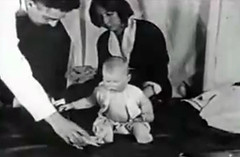Learning
| 5367230633 | learning | a relatively permanent change in an organism's behavior due to experience |  | 0 |
| 5367230634 | habituation | decreasing responsiveness with repeated stimulation | 1 | |
| 5367230635 | mere exposure effect | this phenomenon causes one to prefer a stimulus as a consequence of repeated exposures to that stimulus, particularly is there if no adverse result of the exposure | 2 | |
| 5367230636 | behavioral learning | forms of learning, such as classical conditioning and operant conditioning, that can be described in terms of stimuli and responses | 3 | |
| 5367230637 | classical conditioning | when a neutral stimulus elicits a response after being paired with a stimulus that naturally elicits a response |  | 4 |
| 5367230638 | neutral stimulus | a stimulus that before conditioning does not produce a particular response |  | 5 |
| 5367230639 | unconditioned stimulus | in classical conditioning, a stimulus that unconditionally—naturally and automatically—triggers a response. |  | 6 |
| 5367230640 | unconditioned response | an unlearned reaction to a stimulus that occurs without previous conditioning |  | 7 |
| 5367230641 | acquisition | The phase of classical conditioning when the CS and the US are presented together. | 8 | |
| 5367230642 | conditioned stimulus | in classical conditioning, an originally neutral stimulus that, after association with an unconditioned stimulus, comes to trigger a conditioned response |  | 9 |
| 5367230643 | conditioned response | in classical conditioning, the learned response to a previously neutral (but now conditioned) stimulus (CS). |  | 10 |
| 5367230644 | extinction (in classical conditioning) | The weakening of a conditioned response in the absence of an unconditioned stimulus |  | 11 |
| 5367230645 | spontaneous recovery | in classical conditioning the re-occurence of conditioning after it had appeared to be extinct | 12 | |
| 5367230646 | stimulus generalization | The phenomenon that occurs when stimuli that are similar but not identical to the conditioned stimulus produce the conditioned response |  | 13 |
| 5367230647 | stimulus discrimination | Process by which an organism learns to respond only to a specific stimulus and not to other similar stimuli | 14 | |
| 5367230648 | taste aversion learning | a form of learning in which an organism learns to avoid a taste after just one pairing of that taste with illness |  | 15 |
| 5367230649 | operant | Skinner's term for an actively emitted or voluntary behavior that operates on the environment to produce consequences | 16 | |
| 5367230650 | operant conditioning | a type of learning in which behavior is strengthened if followed by a reinforcer or diminished if followed by a punisher. |  | 17 |
| 5367230651 | Law of effect | Thorndike's principle that behaviors followed by favorable consequences become more likely, and that behaviors followed by unfavorable consequences become less likely |  | 18 |
| 5367230652 | reinforcer | In operant conditioning, any event that strengthens the behavior it follows. |  | 19 |
| 5367230653 | positive reinforcer | A stimulus added to the environment that strengthens the response (makes it more likely to reoccur) |  | 20 |
| 5367230654 | negative reinforcer | the removal of an unpleasant stimulus that increases the likelihood that behavior will continue; is more effective in learning than punishment | 21 | |
| 5367230655 | operant chamber | a chamber also known as a Skinner box, containing a bar or key that an animal can manipulate to obtain a food or water reinforcer, with attached devices to record the animal's rate of bar pressing or key pecking. Used in operant conditioning research. |  | 22 |
| 5367230656 | reinforcement contingencies | relationships between a response and the changes in stimulation that follow the response | 23 | |
| 5367230657 | continuous reinforcement | reinforcing the desired response every time it occurs |  | 24 |
| 5367230658 | shaping | an operant conditioning procedure in which reinforcers guide behavior toward closer and closer approximations of the desired behavior | 25 | |
| 5367230659 | intermittent reinforcers | a type of reinforcement schedule in which some, but not all, of the correct responses are reinforced | 26 | |
| 5367230660 | extinction (in operant conditioning) | A process by which a response that has been learned is weakened by the absence or removal of reinforcement. | 27 | |
| 5367230661 | schedules of reinforcement | Programs specifying the frequency and timing of reinforcements. |  | 28 |
| 5367230662 | ratio schedule | A program by which reinforcement depends on the number of correct responses. | 29 | |
| 5367230663 | interval schedule | a program by which reinforcement depends on the time interval elapsed since the last reinforcement | 30 | |
| 5367230664 | fixed ratio schedules | Programs by which reinforcement is contingent on a certain, unvarying number of responses | 31 | |
| 5367230665 | variable ratio schedules | Reinforcement programs by which the number of responses required for a reinforcement varies | 32 | |
| 5367230666 | fixed interval schedules | Programs by which reinforcement is contingent on a certain, fixed time period | 33 | |
| 5367230667 | variable interval schedules | programs by which the time period between reinforcements varies | 34 | |
| 5367230668 | primary reinforcers | reinforcers that meet an organism's basic survival needs, such as food and water |  | 35 |
| 5367230669 | secondary reinforcers | learned reinforcers, such as money, that develop their reinforcing properties because of their association with primary reinforcers | 36 | |
| 5367230670 | token economy | an operant conditioning procedure in which people earn a token of some sort for exhibiting a desired behavior and can later exchange the tokens for various privileges or treats. |  | 37 |
| 5367230671 | Premack principle | principle that a less preferred behavior can be increased in frequency by reinforcing it with a more preferred behavior | 38 | |
| 5367230672 | punishment | an event that decreases the behavior that it follows |  | 39 |
| 5367230673 | positive punishment | following an undesired response by adding an unpleasant stimulus to decrease the likelihood of the behavior reoccuring |  | 40 |
| 5367230674 | negative punishment (omission training) | the removal of a pleasant stimulus following an undesired response to decrease the likelihood that the behavior will reoccur | 41 | |
| 5367230675 | insight learning | the process of mentally working through a problem until the sudden realization of a solution occurs |  | 42 |
| 5367230676 | cognitive map | a mental representation of the layout of one's environment. |  | 43 |
| 5367230677 | observational learning | A form of cognitive learning - learning by watching others' behavior and the consequences of their behavior |  | 44 |

